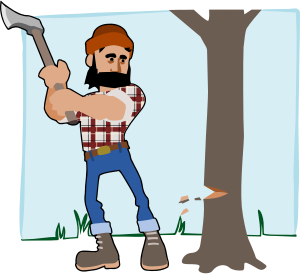The Snake and the Woodcutter Part 1
 Once uponupon a time, a woodcutterwoodcutter was hard at work choppingchopping down a big oak tree, when suddenlysuddenly he heard a hiss, and then a soft voice called,called, "Help me, please."
Once uponupon a time, a woodcutterwoodcutter was hard at work choppingchopping down a big oak tree, when suddenlysuddenly he heard a hiss, and then a soft voice called,called, "Help me, please."
The woodcutter looked down and saw a snake trappedtrapped in the fork of the tree. The snake wriggledwriggled this way and that, but no mattermatter how hard he trytried to free himself,himself, he was stuck.
"Sir, I beg you to free me," the snake pleadeded in his hissyhissy voice.
The woodcutter shook his head. "I must not do that," he said, "for if I free you from this trap, I fear you willyou'll bite me."
"Oh, no, no," the snake argued,d, "I swear I would never hurt you."
Now the woodcutter was a kind man, so he agreedd to help set the creature free. He placedplaced his ax insideinside the fork and yankedyanked with all his might until the snake was free. The moment the snake hit the ground, he reareded his head and preparedprepared to bite the poor woodcutter.
"I knew it," the woodcutter cry.cried "YouareYou're a viper. You choose to only reward good deeds with cruelty."cruelty." The woodcutter shook his head sadly.
"That is the way of the world," the snake hissed.hissed. "Good deeds are alwaysalways rewardedrewarded with evil,evil, you know."
"That isThat's not true at all!" arguedargued the woodcutter. "OftenOften good deeds are rewarded with good. That, too, is the way of the world."
|
Comprehension Clarify these words: fork, wriggled, beg, pleaded, agreed, creature, yanked, all his might, reared his head, reward, deeds, cruelty, evil, argued. Retell what has happened so far in this fable. Make inferences or give opinions about:
Predict what you think might happen next. What question could you ask about this chapter? Visualise these uses of descriptive language: wriggled this way and that; pleaded in his hissy voice; yanked with all his might; reared his head and prepared to bite; shook his head sadly. Make a connection with this chapter. |
Word Study Verb endings: What happens when we add s, ed or ing to: chop, trap, wriggle, try, bite, shake, swear, agree, place, prepare, cry. Other affixes: What happens when we add prefixes and suffixes like ly, y, ty to these words: sudden, sad, hiss, cruel. What two words make up these compound words: woodcutter, himself, inside. What two words are contracted here: you'll, you're, that's.
|